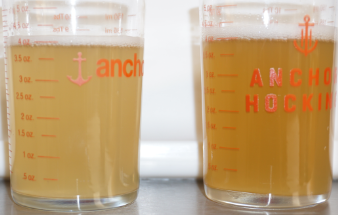TheSmithsEra
Well-Known Member
- Joined
- Jul 16, 2012
- Messages
- 519
- Reaction score
- 50
I really like this thread

When moving to full 5gal boils, should you adjust the amount of hops?
I keep reading conflicting info
When moving to full 5gal boils, should you adjust the amount of hops?
I keep reading conflicting info
When moving to full 5gal boils, should you adjust the amount of hops?
I keep reading conflicting info

















Would it be a waste to add the nutrients pre-boil or should it be added post boil to the wort in the primary as I assume?
What I do is add the nutrient to warm water and let it dissolve. Then add to the pot 5min before flame out.
oxygenation is really useful only for liquid yeasts.
I have been partial mash brewing for a while. I recently got beersmith2 and honestly, I don't know if I am partial mashing or just extract with steeping grains
How do you keep track of what is extract with steeping an what is partial mash?
I've never heard this before. Using pure o2 is beneficial to higher SG worts regardless of yeast type used in my opinion.

I have been partial mash brewing for a while. I recently got beersmith2 and honestly, I don't know if I am partial mashing or just extract with steeping grains
How do you keep track of what is extract with steeping an what is partial mash?
Using yeast nutrient as well as adding O2 greatly helps avoid stuck fermentation, you know the dreaded 1.020 FG. I don't get the lag time and also stronger fermentation's when going the extra mile. Thats with both dry and liquid yeast. Ive been in a habit lately of making my starters 500ml more than whats needed and storing it to make a starter later. Cool way to get multiple uses out of one pack without having to wash yeast. I do this with dry also.
Your hurting nothing and have all to gain.
Right, I just didn't notice any difference when I used the nutrients compared with not using it. My last batch was a PM white IPA, had a capsule of nutrients and forgot to add... still finished at 1.015. But at a dollar and change, it doesn't hurt and costs little. If I did AG full boils I would be much more prone to this. But I do either extract or PM and always partial boils so not as important for me I guess.
|
- Find a "zombie" topic with the right title.
- Add some "brewers unite" attitude.
- Combine with positive discussion focusing on brewing with extract (without kits).


I like this idea, but I will admit that I never stepped up, my game. I have been happy without the extra time, effort and space required for stepping up.

In the first line, "use distilled water."extract brewing
Let's see what develops in 2022 ...
- Find a "zombie" topic with the right title.
- Add some "brewers unite" attitude.
- Combine with positive discussion focusing on brewing with extract (without kits).
edit: formatting


I meant that I have stuck with extract + steeping and have not moved beyond that. Not all of my recipes even involve steeping grains and I do not have temperature control for fermentation beyond a basement that is always 60-70 F. But I am still interested in hearing about good methods and ideas.Stepping up to what?
Yes. Basically, "they" take just the water out, leaving all the minerals behind. Using water that has no minerals (or is low in minerals) avoids over-mineralizing the wort.Does DME still contain brewing salts?
Now that makes sense--thank you. With the Belgian beers, I've been adding mineral salts according to my previous understanding and maybe a pinch of myth. I fancy the water used back then as possibly really high in minerals. I think of old ales in the same way. I wouldn't imagine it matters much if I add mineral salts to those but if it's a waste of time, I'd probably skip it.leaving all the minerals behind.
That is, basically, my philosophy for beer making. Couldn't have stated it better for myself.I meant that I have stuck with extract + steeping and have not moved beyond that. Not all of my recipes even involve stepping grains and I do not have temperature control for fermentation beyond a basement that is always 60-70 F. But I am still interested in hearing about good methods and ideas.
If you're brewing a beer that you enjoy by adding some minerals to an extract recipe, keep doing it.I wouldn't imagine it matters much if I add mineral salts to those but if it's a waste of time, I'd probably skip it.
Yeah, it's what I thought. Thanks.If you're brewing a beer that you enjoy by adding some minerals to an extract recipe, keep doing it.
Two resources for ideas on what base malts may have been used when making DME/LME:
Agreed - both are solid resources.BTW, there is a pretty solid article in the most recent Zymurgy about converting all-grain recipes over to extract. Appendix C of "Modern Homebrew Recipes" by Gordon Strong is the best resource that I have found on converting all-grain recipes to extract.


| 
|
| OG 22-ish (left); OG 44-ish (right) | OG 44-ish (left); OG 22-ish (right) |